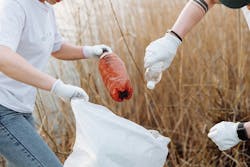Pa. DOT Pilot Paves with Plastic
Officials from the state Departments of Transportation (PennDOT), Conservation and Natural Resources (DCNR), Environmental Protection (DEP), and General Services (DGS) highlighted a pilot project to pave part of a Ridley Creek State Park roadway with an asphalt and recycled plastic mixture.
The project includes two quarter-mile roadway stretches surfaced with an asphalt/recycled-plastic mix. The material is intended to strengthen the roadway surface without leaching plastic material into the surrounding environment.
The material being tested supports interagency goals to increase the commonwealth’s sustainability in operations while supporting deployment in the state overall.
Benefits to asphalt with recycled plastic
Potential benefits, according to PennDOT:
- Extended useful life of asphalt pavements
- Diverting waste plastics from landfills and helping to establish a viable market for these plastics
- Continued ability to reuse asphalt millings in future recycled-asphalt pavement applications
According to a report in The AASHTO Journal:
“The pellets are comprised of high-density and low-density polyethylene – known colloquially as Number 2 and 4 plastics, respectively – plus an additive. Common Number 2 plastic products include milk jugs, shampoo bottles, and some plastic toys. Number 4 plastics, by contrast, are lighter and best known for making grocery bags, shrink-wrap, and bread bags to package.
“The process heating a mixture of those pellets and recycled asphalt pavement or RAP then applying it to the road surface is ‘relatively consistent with conventional pavement preparation processes,’ noted PennDOT Press Secretary Alexis Campbell.
“The amount of pellet material can vary from job to job, usually comprising two to four percent of the asphalt binder, Campbell said. If a project uses the maximum amount of pellet material in an application, that can translate to up to three million plastic grocery bags per mile paved.”
The pilot project location was chosen in coordination with sibling agencies and supports increased emphasis on sustainable practices. The pilot is incorporated into a 1.5-mile reconstruction project within the park from the entrance to Pavilion 14. The rest of the roadway is being paved with a standard asphalt mixture to provide a comparison for the new material over the five-year evaluation period.
“Sustainability is at the core of DCNR’s mission and we are pleased that one of our 121 state parks was selected to be a part of this innovative pilot project,” said Cindy Adams Dunn, DCNR secretary, in a prepared statement. “We look forward to testing this new technology based on the expected benefits, and are hopeful that it is a model for future successes in Pennsylvania—especially with regards to state agencies collaborating to create more sustainable operations and policies across the commonwealth.”
“Transportation is integral in our communities and we are always evolving our operations,” said Mike Keiser, PennDOT acting deputy secretary for highway administration, in a statement. “We are very pleased when we can pursue innovations bringing benefits to the public, our transportation assets, and our environment.”
Source: PennDOT
